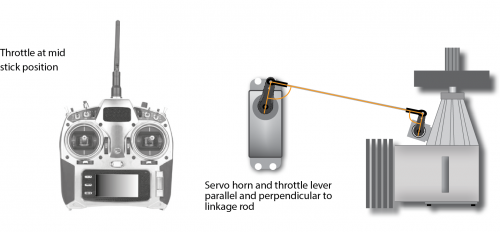GOVERNOR MENÜ A - Sensortest
Bei GOVERNOR MENÜ Punkt A wird geprüft, ob der Drehzahlsensor bzw. das Signalkabel für die Drehzahl korrekt angeschlossen ist und grundsätzlich ein auswertbares Drehzahlsignal anliegt.
Achtung! An diesem Einstellpunkt hast Du volle Kontrolle über den Gaskanal, d.h. über den Gaskanal an der Fernsteuerung kann der Motorsteller/das Gasservo am Ausgang [CH5] direkt angesteuert werden.
Achtung! Elektromotoren drehen mit hohen Geschwindigkeiten. Halte während des Funktionstests ausreichend Sicherheitsabstand. Wir empfehlen den Motor für den Test vom Hauptgetriebe abzukoppeln. Beachte aber unbedingt die Herstellervorschriften des Motors. Manche Motoren dürfen nicht ohne Last betrieben werden. Lass in diesem Fall den Motor nur kurz laufen oder lass den Motor am Hauptgetriebe angekoppelt und entferne nur die Haupt- und Heckrotorblätter (Vorsicht! Erhöhtes Verletzungsrisiko!).
Elektromodell: Gib vorsichtig Gas damit sich der Motor dreht und der Phasensensor bzw. der Motorsteller ein Drehzahlsignal ausgibt. Sobald der Motor läuft, sollte die Status LED am MICROBEAST PLUS rot aufleuchten. Wir weisen darauf hin, dass der nutzbare Steuerbereich vom Gas für eine optimale Performance der Regelung entscheidend ist. Üblicherweise wird der Steuerweg des Fernsteuersenders im Motorsteller durch einen initialen Programmiervorgang fixiert. Es gibt aber auch Motorsteller, bei denen die Servowege für den Gaskanal im Sender so angepasst werden, dass sie mit der Vorgabe des Stellers übereinstimmen. Bei Einstellpunkt A bietet sich die Möglichkeit, nochmals zu überprüfen ob die Einstellung korrekt durchgeführt wurde. Der Motor sollte möglichst genau dann mit voller Drehzahl drehen, wenn der Steuerknüppel die Vollgasposition erreicht. Falls der Motor schon viel früher mit der maximal möglichen Drehzahl dreht, reduziere den Servoweg im Sender oder wiederholen Sie die Programmierung des Motorstellers. Damit der Drehzahlregler von MICROBEAST PLUS optimal arbeiten kann, sollte die Motordrehzahl möglichst linear zur Knüppelbewegung ansteigen und es sollte keine Bereiche geben, in denen sich die Drehzahl nicht verändert.
With a nitro/gas powered helicopter you can simply rotate the clutch or engine crankshaft by hand until the signal generator (magnet or similar) passes the sensor. Whenever the signal generator is within the detection range of the sensor the Status-LED should light up in blue color. In addition to the function control of the sensor, check the throw setting for the throttle servo in the remote control and adjust if necessary: Set the throttle to mid stick position and attach the servo horn, so that the throttle linkage is at a right angle to the servo horn. Then adjust the length of the linkage according to the instructions of the helicopter, so that it also is positioned perpendicular to the linkage lever at the carburetor. Adjust the lever at the carburetor so that it is opened halfways (note the markings on the carburetor!). Now move the throttle stick towards full throttle and adjust the servo travel in the transmitter accordingly, so that the full throttle position is reached without binding. Lastly move both throttle stick and throttle trim on the transmitter to the „motor off“ position and also adjust the servo travel in that direction until the carburetor is fully closed. If the servo travel must be greatly reduced in both directions, it is recommended that the linkage ball on the servo arm is mounted further in so that the servo can be moved over a wider range. For more information refer to the instruction manual for your helicopter.

If the Status-LED on the MICROBEAST PLUS does not light up as described please double check the wiring. Particularly pay attention whether the power wires of the sensor are of correct polarity (on some sensors the wire colors do not match the usual standard!). If you have a magnetic sensor check if the magnets are installed with the correct polarity and if they are passing the front of the sensor close enough. Using a crankshaft sensor make sure that the sensor is mounted close enough to the frame accordingly.